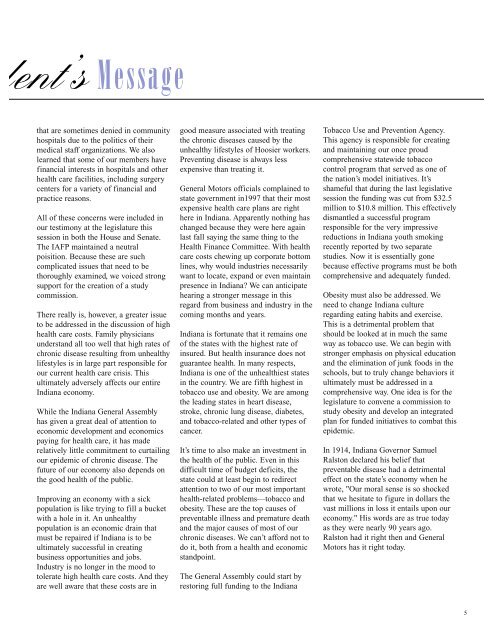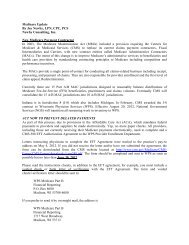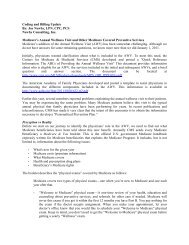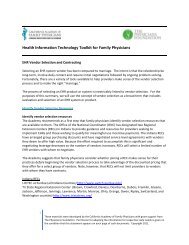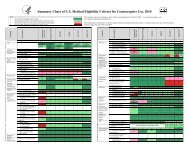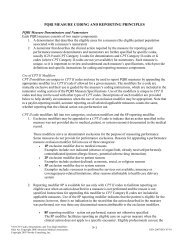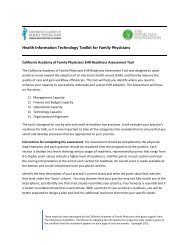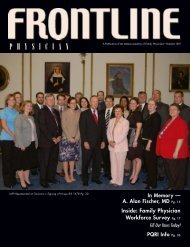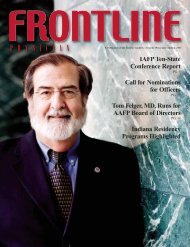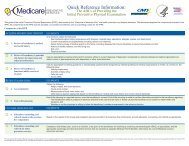Spring - Indiana Academy of Family Physicians
Spring - Indiana Academy of Family Physicians
Spring - Indiana Academy of Family Physicians
You also want an ePaper? Increase the reach of your titles
YUMPU automatically turns print PDFs into web optimized ePapers that Google loves.
ent’s<br />
Message<br />
that are sometimes denied in community<br />
hospitals due to the politics <strong>of</strong> their<br />
medical staff organizations. We also<br />
learned that some <strong>of</strong> our members have<br />
financial interests in hospitals and other<br />
health care facilities, including surgery<br />
centers for a variety <strong>of</strong> financial and<br />
practice reasons.<br />
All <strong>of</strong> these concerns were included in<br />
our testimony at the legislature this<br />
session in both the House and Senate.<br />
The IAFP maintained a neutral<br />
poisition. Because these are such<br />
complicated issues that need to be<br />
thoroughly examined, we voiced strong<br />
support for the creation <strong>of</strong> a study<br />
commission.<br />
There really is, however, a greater issue<br />
to be addressed in the discussion <strong>of</strong> high<br />
health care costs. <strong>Family</strong> physicians<br />
understand all too well that high rates <strong>of</strong><br />
chronic disease resulting from unhealthy<br />
lifestyles is in large part responsible for<br />
our current health care crisis. This<br />
ultimately adversely affects our entire<br />
<strong>Indiana</strong> economy.<br />
While the <strong>Indiana</strong> General Assembly<br />
has given a great deal <strong>of</strong> attention to<br />
economic development and economics<br />
paying for health care, it has made<br />
relatively little commitment to curtailing<br />
our epidemic <strong>of</strong> chronic disease. The<br />
future <strong>of</strong> our economy also depends on<br />
the good health <strong>of</strong> the public.<br />
Improving an economy with a sick<br />
population is like trying to fill a bucket<br />
with a hole in it. An unhealthy<br />
population is an economic drain that<br />
must be repaired if <strong>Indiana</strong> is to be<br />
ultimately successful in creating<br />
business opportunities and jobs.<br />
Industry is no longer in the mood to<br />
tolerate high health care costs. And they<br />
are well aware that these costs are in<br />
good measure associated with treating<br />
the chronic diseases caused by the<br />
unhealthy lifestyles <strong>of</strong> Hoosier workers.<br />
Preventing disease is always less<br />
expensive than treating it.<br />
General Motors <strong>of</strong>ficials complained to<br />
state government in1997 that their most<br />
expensive health care plans are right<br />
here in <strong>Indiana</strong>. Apparently nothing has<br />
changed because they were here again<br />
last fall saying the same thing to the<br />
Health Finance Committee. With health<br />
care costs chewing up corporate bottom<br />
lines, why would industries necessarily<br />
want to locate, expand or even maintain<br />
presence in <strong>Indiana</strong>? We can anticipate<br />
hearing a stronger message in this<br />
regard from business and industry in the<br />
coming months and years.<br />
<strong>Indiana</strong> is fortunate that it remains one<br />
<strong>of</strong> the states with the highest rate <strong>of</strong><br />
insured. But health insurance does not<br />
guarantee health. In many respects,<br />
<strong>Indiana</strong> is one <strong>of</strong> the unhealthiest states<br />
in the country. We are fifth highest in<br />
tobacco use and obesity. We are among<br />
the leading states in heart disease,<br />
stroke, chronic lung disease, diabetes,<br />
and tobacco-related and other types <strong>of</strong><br />
cancer.<br />
It’s time to also make an investment in<br />
the health <strong>of</strong> the public. Even in this<br />
difficult time <strong>of</strong> budget deficits, the<br />
state could at least begin to redirect<br />
attention to two <strong>of</strong> our most important<br />
health-related problems—tobacco and<br />
obesity. These are the top causes <strong>of</strong><br />
preventable illness and premature death<br />
and the major causes <strong>of</strong> most <strong>of</strong> our<br />
chronic diseases. We can’t afford not to<br />
do it, both from a health and economic<br />
standpoint.<br />
The General Assembly could start by<br />
restoring full funding to the <strong>Indiana</strong><br />
Tobacco Use and Prevention Agency.<br />
This agency is responsible for creating<br />
and maintaining our once proud<br />
comprehensive statewide tobacco<br />
control program that served as one <strong>of</strong><br />
the nation’s model initiatives. It’s<br />
shameful that during the last legislative<br />
session the funding was cut from $32.5<br />
million to $10.8 million. This effectively<br />
dismantled a successful program<br />
responsible for the very impressive<br />
reductions in <strong>Indiana</strong> youth smoking<br />
recently reported by two separate<br />
studies. Now it is essentially gone<br />
because effective programs must be both<br />
comprehensive and adequately funded.<br />
Obesity must also be addressed. We<br />
need to change <strong>Indiana</strong> culture<br />
regarding eating habits and exercise.<br />
This is a detrimental problem that<br />
should be looked at in much the same<br />
way as tobacco use. We can begin with<br />
stronger emphasis on physical education<br />
and the elimination <strong>of</strong> junk foods in the<br />
schools, but to truly change behaviors it<br />
ultimately must be addressed in a<br />
comprehensive way. One idea is for the<br />
legislature to convene a commission to<br />
study obesity and develop an integrated<br />
plan for funded initiatives to combat this<br />
epidemic.<br />
In 1914, <strong>Indiana</strong> Governor Samuel<br />
Ralston declared his belief that<br />
preventable disease had a detrimental<br />
effect on the state’s economy when he<br />
wrote, "Our moral sense is so shocked<br />
that we hesitate to figure in dollars the<br />
vast millions in loss it entails upon our<br />
economy." His words are as true today<br />
as they were nearly 90 years ago.<br />
Ralston had it right then and General<br />
Motors has it right today.<br />
5


